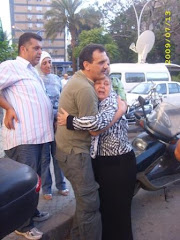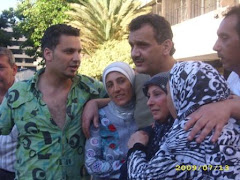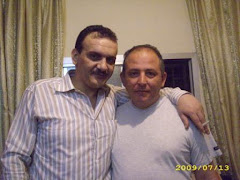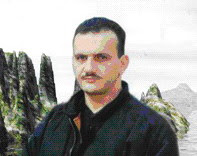Copyright (c) 2007 The Daily Star
Wednesday, December 12, 2007
Rights group cries foul in Chaaban case
By The Daily Star
BEIRUT: Amnesty International has written to the Lebanese authorities calling for an independent review of the case of Yusef Chaaban, who was sentenced to life imprisonment in October 1994, a statement issued by the human rights non-governmental organization (NGO). A Palestinian refugee resident in Lebanon, Chaaban was convicted by the Judicial Council of the January 1994 killing of Jordanian diplomat Naib Omran al-Maaita.
"On June 12, 2007, the UN Working Group on Arbitrary Detention declared Yusef Chaaban's continuing detention to be arbitrary and called for the Lebanese authorities to remedy the matter," the statement said.
According to Amnesty, the working group found that he had been denied a fair trial, notably because he was denied the right to have his conviction and sentence reviewed by a higher tribunal. The UN body found also that the violation he suffered was the more severe because a "confession," accepted by the court as evidence against him, was allegedly extracted under torture and new information appears to support this claim.
Amnesty said following his arrest, Chaaban was held in "secret, incommunicado detention for 10 days without access to a lawyer and for a further month without contact with his family."
"He was initially held in secret by Syrian intelligence officials at [the] Beau Rivage detention center they previously operated in Beirut before being handed over to the Lebanese Criminal Investigations Police in Furn al-Shebbak," it said.
Amnesty explained that at his trial, Chaaban alleged that while detained he was tortured and otherwise ill-treated to make him "confess," but the court failed adequately to investigate his allegations of torture and other ill-treatment.
"He was also denied the opportunity to appeal against his conviction and sentence to a higher tribunal, as required by recognized international standards on the right to fair trial," the NGO said.
According to Amnesty, Chaaban alleges that various torture methods were used against him during his detention, including sitting in a metal chair with moving parts that stretch the spine, suspension from his wrists while they were tied behind his back, electric shocks, threats and denial of food, water and sleep. His family were not informed of his detention for 40 days.
"Amnesty International has previously expressed concern that trials before the Judicial Council fail to satisfy international standards for fair trials and has documented a number of trials which were deficient," the statement said.
Amnesty argued in its statement that it was unclear on what criteria cases are selected by the Cabinet for referral to the Judicial Council, and the latter has failed to order independent investigations into allegations of torture during pre-trial detention made by defendants at trial.
"Further, as the Human Rights Committee noted in 1997, 'the fact that decisions passed by the Judicial Council are not subject to appeal' breaches the fair trial requirements of the International Covenant on Civil and Political Rights, and Lebanon's obligations as a party to this treaty," it added.
"In the case of Chaaban, new developments since 1994 have raised further questions about the safety of his conviction and consequent imprisonment," the statement said.
On December 3, 2001, the Jordanian State Security Court convicted Yasser Mohammad Ahmad Salameh Abu Shanaar, Aqaab Namer Suleiman Fuqhaa and Jamal Darwish Mustafa Fatayr of the same killing. Amnesty said the prosecution made no reference to Chaaban.
"Indeed, the only reference made to Yusef Chaaban during this trial was by one of the accused who explicitly denied that Chaaban had participated in the assassination," the group said.
Also, according to the NGO, the report of a ballistics expert appointed by Chaaban's lawyer that was presented to the Judicial Council on October 23, 2007, a copy of which Amnesty International has seen, "casts serious doubt on the description of events as portrayed at the trial before the Justice Council."
In view of these developments, the NGO urged the Lebanese authorities to ensure that the conviction and imprisonment of Chaaban is "made the subject of an urgent, thorough and independent review in order to ensure that any miscarriage of justice is remedied at the earliest opportunity and that he is guaranteed a fair re-trial in accordance with international standards or released." - The Daily Star
mercredi 12 décembre 2007
Daily Star Article
mardi 23 octobre 2007
Speech of Wadih Al Asmar, Secretary General of the CLDH (Lebanese Center for Human Rights), on the occasion of the press conference held this Friday October 19, 2007, entitled:
WHY DOES THE LEBANESE JUDICIARY CONTINUE TO COVER UP RUSTOM GHAZALEH’S CRIMES?
Let me begin, on behalf of the Lebanese Center for Human Rights, by thanking you all for being here today. I particularly would like to emphasize the key role that the media play in contributing their support to our struggle for a greater respect for human rights in Lebanon.
We have invited you here today to this press conference in order to share with you our assessment of the lobbying and awareness campaign that we have conducted with the goal of drawing the attention of the political an d judicial authorities, as well as the religious ones, to the tragic situation of Youssef Chaabane. Mr. Chaabane has been detained for more than 14 years on the basis of a court judgment that violates Lebanon’s international commitments.
The opinion of the United Nations Working Group on Arbitrary Detention in this matter is a sign of the mistrust expressed vis-à-vis the Lebanese justice system in its totality. The experts of the United Nations were very explicit when they qualified the detention of Youssef Chaabane as “arbitrary”. The Working Group believes that: “to be sentenced to death, even when the sentence is commuted to a life term, while denying the concerned individual to have the conviction and the sentence reviewed by a higher jurisdiction, is in itself a very serious violation of the norms of a fair trial.”
The Working Group believes (…) that the violation of Paragraph 5 of Article 14 of the International Covenant on Civil and Political Rights – to which Lebanon is a party – is of such an egregious nature that it confers upon the detention and conviction of Mr. Chaabane an arbitrary character.”
Following this campaign, there is a lingering feeling of a profound malaise, since we have come to the unpleasant conclusion that since April 2005, when the Syrian forces withdrew, nothing has changed in Lebanon. How else should one interpret the dogged stubbornness of an entire judiciary to protect a decision made following an unfair trial which itself began with an illegal arrest and detention at the Syrian Intelligence Center in Beau Rivage, and following an investigation conducted under the aegis of Rustom Ghazaleh himself?
Does Mr. Ghazaleh’s ghost continue to haunt the Justice Palace? Or are some people so afraid of what Mr. Ghazaleh could reveal of their past that they thus continue to tread carefully around him?
Lebanon has paid too dear a price in getting rid of the Syrian occupation that we cannot accept that crimes and judicial errors committed during that period go unpunished.
Many arguments can be, and have been, put forth by eminent and respected legal experts that it is impossible to re-open the case of Youssef Chaabane because he was tried before the Judicial Council and the decisions of the Council may not be appealed. We, however, would like to remind the experts that:
The Lebanese Constitution gives precedence to Lebanon’s international commitments over Lebanese law, and therefore nothing prevents the experts fro m relying on the International Covenant on Civil and Political Rights to set up an appeals process for judgments issued by the Judicial Council, by simply adopting a positive interpretation of the law without recourse to Parliament.
Another trial took place in Jordan in 2000 on the same case, and at no time did that trial implicate Youssef Chaabane. This constitutes an exceptional factor that should prompt them to review the case. The question is not whether or not to put more credence in Jordanian justice; rather, it is basic common sense that should compel the Lebanese judiciary to immediately request from the Jordanian authorities to transmit those evidentiary elements that allowed them to make a decision and then review Youssef Chaabane’s trial in light of those elements.
Rustom Ghazaleh is no longer in Lebanon. The fact that he was directly or indirectly involved in the trial should be reason enough to repeal the trial.
The Lebanese Constitution gives precedence to Lebanon’s international commitments over Lebanese law, and therefore nothing prevents the experts fro m relying on the International Covenant on Civil and Political Rights to set up an appeals process for judgments issued by the Judicial Council, by simply adopting a positive interpretation of the law without recourse to Parliament.
Another trial took place in Jordan in 2000 on the same case, and at no time did that trial implicate Youssef Chaabane. This constitutes an exceptional factor that should prompt them to review the case. The question is not whether or not to put more credence in Jordanian justice; rather, it is basic common sense that should compel the Lebanese judiciary to immediately request from the Jordanian authorities to transmit those evidentiary elements that allowed them to make a decision and then review Youssef Chaabane’s trial in light of those elements.
Rustom Ghazaleh is no longer in Lebanon. The fact that he was directly or indirectly involved in the trial should be reason enough to repeal the trial.
We continue to dare and hope that there are still in Lebanon judges who are capable of placing their consciences ahead of their careers. It is to these judges that we address ourselves today to ask them to take up this case and be creative in finding a legal solution that would allow Youssef Chaabane to be re-tried fairly. We will never accept that decisions made under pressure from Ghazi Kanaan, Rustom Ghazaleh and their henchmen remain in the records of Lebanese justice.
Wadih Al Asmar,
CLDH General Secretary
Inscription à :
Commentaires (Atom)








